Rio, I wish you peace
RIO DE JANEIRO, June 2, 2015 – It’s another sunny morning in the Flamengo park, a lush oasis of palm trees and talkative parrots opposite the Guanabara Bay – where the sailing races will be held during next year’s Olympic Games.
Two friends bump into each other by chance, and stop for a chat. As they part I hear one say to the other: ‘Muito amor, muita saúde, muita paz’ – much love, much health, much peace.
'Peace?' But Brazil is not at war... Or is it?
Since moving to Rio four years ago I have been struck by this habit Cariocas have of wishing peace upon one another. On New Year’s Eve they dress all in white and spill onto Copacabana beach to pray for peace in the coming year. The city has a whole string of NGOs with the word ‘peace’ in their name. One of them is Rio da Paz - which stages installations in public places to draw attention to the national problem of violence.
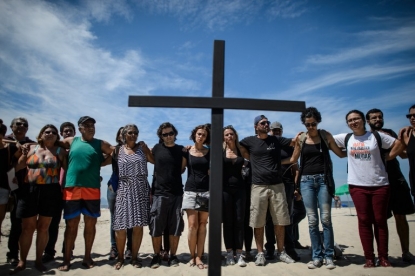 Members of the NGO Rio da Paz rally against violence on Copacabana beach on April 5, 2015 (AFP Photo / Yasuyoshi Chiba)
Members of the NGO Rio da Paz rally against violence on Copacabana beach on April 5, 2015 (AFP Photo / Yasuyoshi Chiba)In January, when stray bullets claimed the life of a 12-year-old girl, their 12th victim in the space of nine days - the association planted a cross with some toys on a city beach. A few days ago, it placed a black bicycle in a pool of red ink to mark the spot, on a cycle path by the Rodrigo de Freitas laguna, where a middle-aged cardiologist was stabbed to death by kids trying to steal his bike. It was the eighth knife attack reported in a week.
Latent racism and a siege mentality
For decades a yawning gulf has separated Brazil’s rich from its poor. Things have improved in recent years thanks to social programs by the left-wing government, but the richest 10 percent still control almost half the country’s wealth.
Add to that latent racism among the mostly-white elites towards the country’s black and mixed-race majority – the poorest ethnic groups who are also the chief victims of everyday violence and the warlike standoff between police and drug traffickers in Brazil.
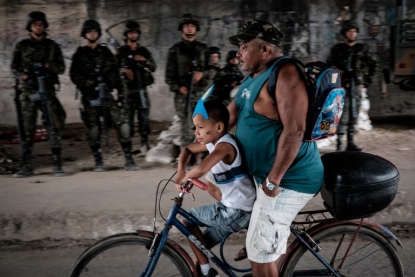 A man and boy pass in front of soldiers of the Brazilian Army as they take positions at a checkpoint during a security operation at Mare Complex shantytown in Rio de Janeiro, Brazil, on April 1, 2015 (AFP Photo / Yasuyoshi Chiba)
A man and boy pass in front of soldiers of the Brazilian Army as they take positions at a checkpoint during a security operation at Mare Complex shantytown in Rio de Janeiro, Brazil, on April 1, 2015 (AFP Photo / Yasuyoshi Chiba)Some two million Cariocas live in the thousand-or-so favelas that dot the city, with no access to basic pubic services. Violence is their daily lot.
Murder rates have dropped a little since 2008, when the police moved in to “occupy” several favelas, and it has become rarer to see drug traffickers walking the streets with impunity, combat weapons in hand. But that didn’t stop our video reporter, Madeleine Pradel, from coming face-to-face with a group of thugs, armed to the teeth, while out shooting a story about a garbage dump in the Rocinha favela. They let her pass only after a lengthy discussion, and because she was accompanied by a local resident.
Six killed by police fire every day
Drug trafficking is still rife. Street battles rage constantly between drug gangs. And the police continues to kill civilians - an average of six per day across the country.
US police are under scrutiny these days over fatal shootings of civilians – some 400 already this year according to newspaper tallies. (In Britain, by way of comparison, the number of people fatally shot by police last year was zero.) But police violence in Brazil is off the charts: in the five years from 2009 to 2013, the country’s police killed more civilians than US police did in three decades.
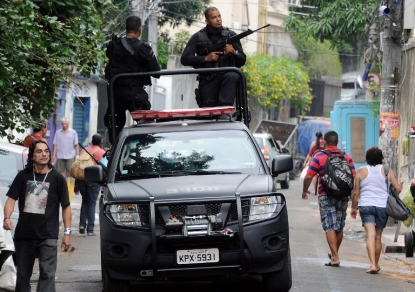
Members of the Special Police Operations Battalion (BOPE) patrol the streets of Rio's Cantagalo favela on April 23, 2014
(AFP Photo / Tasso Marcelo)
Many of my Brazilian friends are just as scared of the police as of criminals. Even now, after several years, I am still stunned by the sight of the fearsome special ops battalion, the BOPE, cruising the streets with rifles sticking out of their vehicle windows, their fingers on the trigger. Their emblem, stamped onto cars, uniforms and business cards, is a skull with a dagger planted in it, before a pair of crossed pistols.
Wave of knife attacks
Between 2007 and April of last year, 50,181 people died a violent death in Rio State. That’s an average of 15 per day. These past weeks have seen a wave of knife attacks in Rio’s centre and its leafiest neighbourhoods – giving the most privileged classes a glimpse of the terror that has reigned in the favelas for decades. These are places where no one is ever safe from the threat of a stray bullet, even inside their own home.
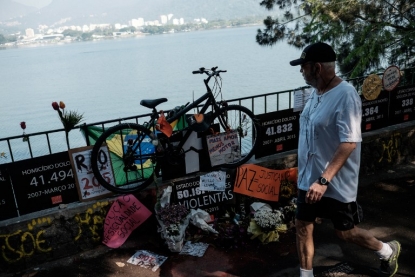
An improvised memorial in Rio, at the spot where cardiologist Jaime Gold was stabbed to death for his bicycle
(AFP Photo / Yasuyoshi Chiba)
Thankfully I have never been assaulted in Rio. Whenever I go out I carry only what is strictly necessary. When on the street I try never to pull out my smartphone – a device worth three months’ minimum wage in Brazil.
But like many Cariocas I have, recently and reluctantly, stopped cycling in the city. Thieves have taken to knocking cyclists violently off their bikes to rob them. Plus this wave of knife attacks…
Paranoia and vigilantes
A year from the Rio Olympics, the feeling here is that no one is safe - in or out of the favelas.
On social media, middle and upper class Cariocas say openly that they are afraid – to the point sometimes of tipping into paranoia and a vigilante mindset. From the balcony of my apartment, and from the windows of AFP’s offices, I’ll often see neighbours yelling as they chase after youths who just stole someone’s wallet or mobile phone. Sometimes they’ll catch one and beat them up until the police turn up – with the videos of the beatings ending up on Facebook and YouTube.
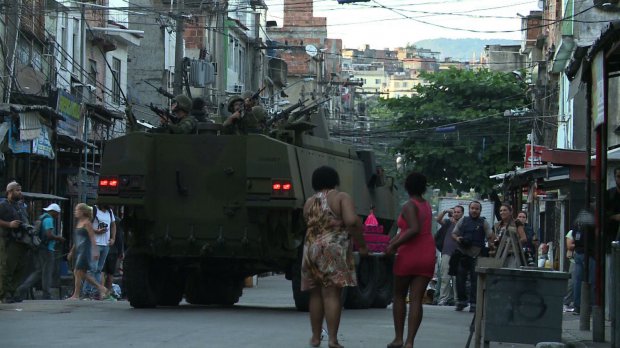
Click here to view on a mobile device
“The myth of the friendly Brazilian exists only in the world of Samba,” the Spanish sociologist Manuel Castellis said in a recent interview. “Relations between people here have always been violent. There is nothing friendly about Brazilian society. People here are busy killing each other. That’s the Brazil you see today on the Internet.”
A violent society
Brazil’s parliament is currently debating a bill that would lower the age of criminal responsibility from 18 to 16. A short while ago, a group of 32 minors were arrested in the Flamengo park, some of them armed with knives. Thirty one were freed the next day.
Youth crime is like a hot potato being passed back and forth between the city mayor, Eduarto Paes, Rio State which is charge of the police, and the country’s judiciary. But punishment aside, NGOs and educational experts warn the country needs to tackle the root causes of youth crime. Most of these kids are out of school, with no family to speak of, living at the margins of a violent society.
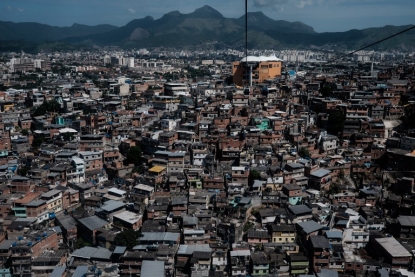 View of the Alemao complex in Rio de Janeiro, Brazil, on April 8, 2015 (AFP Photo / Yasuyoshi Chiba)
View of the Alemao complex in Rio de Janeiro, Brazil, on April 8, 2015 (AFP Photo / Yasuyoshi Chiba)Flamengo park is very popular among Cariocas. I often go walking there, alone or with my young children - though never after dark. I have never run into any trouble. But one day while out jogging I came across a man holding a gun to another man’s neck, yelling and insulting him. Perhaps a plain clothes police officer? Or not. I will never know because – like all the other people who witnessed the scene – I got out of there as fast as I could.
City in shock
Alba Zaluar has been studying Rio’s favelas for 35 years. The anthropologist describes a city “in a state of shock”. “The violence is entirely linked to drug trafficking.” But she says the city is also blighted by failing public schools, social inequality, police violence…
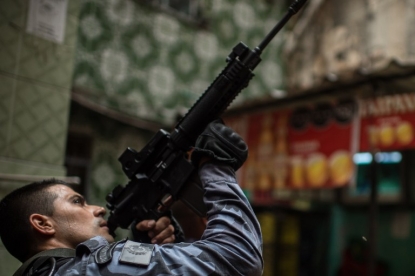 Military police commandos on patrol in Rio's Mare Complex shantytown on April 1, 2015. (AFP Photo / Christophe Simon)
Military police commandos on patrol in Rio's Mare Complex shantytown on April 1, 2015. (AFP Photo / Christophe Simon)IMF director Christine Lagarde declared upon visiting the Complexo do Alemao favelas that its telecabin reminded her of a ski resort. That is certainly not what it feels like on the ground. Despite five years of efforts to “pacify” the complex of around 15 favelas, “the violence is just as bad,” according to Madalena Alves de Assis, a 30-year-old unemployed single mother, talking to me outside the local social services office. “Innocent people are still getting killed.”
She fears for the lives of her three children, aged six, eight and 10. In April a 10-year-old boy named Eduardo de Jesús was shot in the head and killed by a stray police bullet, in broad daylight, while playing outside his home. “Fear is a constant here,” says Zaquel Nunes, a resident of the neighbourhood where four people including the little boy died in two days of violence. “There are shootouts every day. It’s like being caught in the middle of a cat and dog fight. Anyone can become a target, at any time, without the slightest warning.”
For more than six million Cariocas, rich or poor, peace has yet to come to Rio.
Laura Bonilla is AFP’s deputy bureau chief for Brazil. Read the original Spanish-language version of her post here.
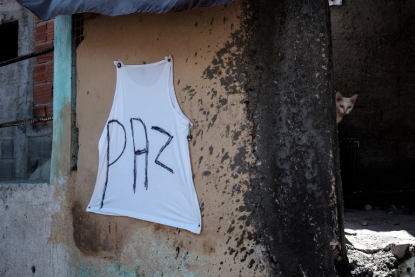 A white shirt reading 'Peace' hangs near the home of 10-year-old Eduardo de Jesus Ferreira, shot dead during clashes between police and drug gangs in Rio's Alemao favela complex, on April 8, 2015 (AFP Photo / Yasuyoshi Chiba)
A white shirt reading 'Peace' hangs near the home of 10-year-old Eduardo de Jesus Ferreira, shot dead during clashes between police and drug gangs in Rio's Alemao favela complex, on April 8, 2015 (AFP Photo / Yasuyoshi Chiba)

